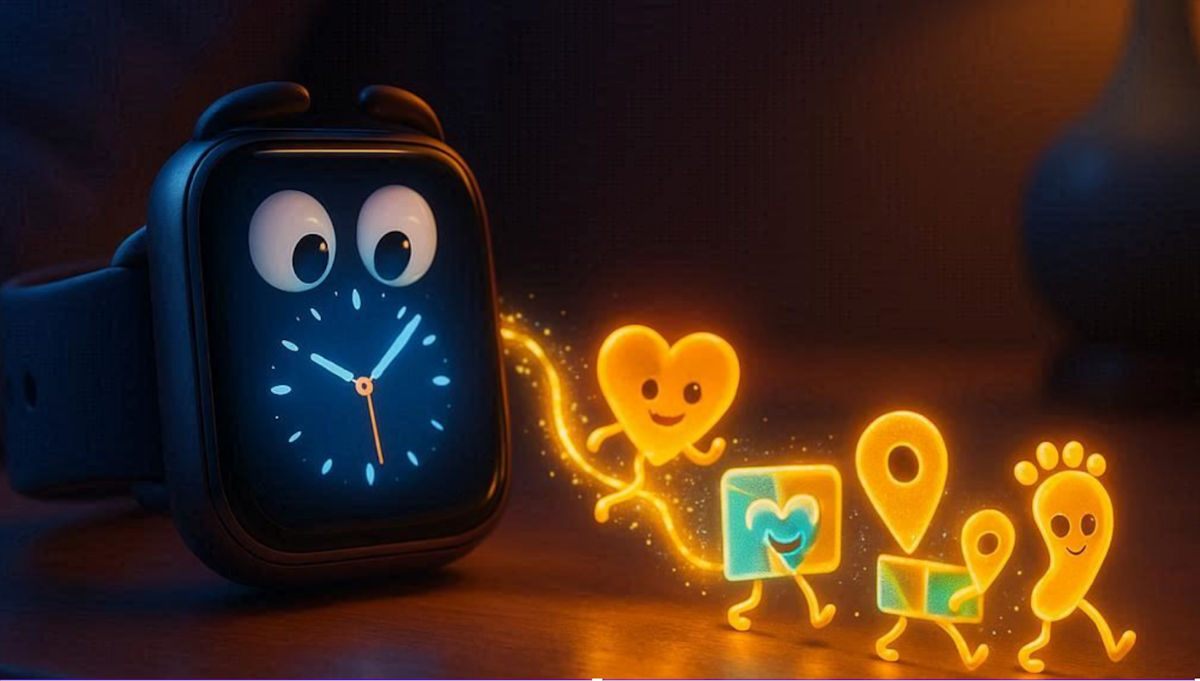Ultrasounds for sale? People were selling them, along with positive pregnancy test photos, on the marketplace app Mercari. They went for about $14 a pop to fake pregnancies and extort men. Wild.
Health data, now with ad targeting

Your smartwatch is great for counting steps and buzzing you when you’ve been sitting on your butt too long. But have you ever stopped to think where all that personal data is going?
From sleep patterns to how stressed you are on a Tuesday afternoon, it’s all being logged in a digital diary. And guess what? That diary is worth big money to advertisers, insurance companies and, of course, hackers.
🗑️ What it collects (spoiler: everything)
- Fitness stuff: Steps, calories, heart rate, workouts
- Health info: Sleep, blood oxygen, cycle tracking, stress
- Behavioral patterns: When you move, how you move
- Location: Where you go, when you go, even when you “go to the gym” but really hit Chipotle
One data point is no big deal, but together? You hand over a complete snapshot of your life.
🤔 Why you should care
- “Anonymized” is not anonymous. They can connect the dots to know who you are.
- Your health data could be used to raise your insurance rates, or worse.
- One breach, and your most personal health info is out in the wild.
- Gain 2 pounds, and it’s all weight loss shakes in your feed.
🔒 Lock it down
1. Pick better apps: Stick to apps with solid privacy policies or ones that store your data on your device instead of the cloud.
✅ Good: CommonHealth, Gadgetbridge, HeartWatch ($9)
🚫 Nope: Talkspace, BetterHelp, MyFitnessPal
2. Turn off unnecessary tracking
- Apple Watch
On iPhone: Settings > Privacy & Security > Analytics & Improvements > turn off Share iPhone & Watch Analytics. - Pixel Watch
On your phone used with your watch: Settings > Google > Manage your Google Account > Data & privacy > turn off Web & App Activity and Location History.
The catfisher in the minivan

Alert: This article is a spoiler for Unknown Number: The High School Catfish on Netflix.
Imagine you’re a high school girl. Your phone won’t stop buzzing. It’s not friendly DMs, texts or social media notifications.
11:37 p.m.
The average bedtime for American adults. We’re clocking six hours and 40 minutes of sleep a night, well below the recommended seven to nine. People who stick to the same bedtime get 40 extra minutes of rest and spend 36% less time tossing and turning. TikTok will still be there tomorrow. Promise.
My pick for antivirus protection: TotalAV delivers strong, real-time protection that blocks malware, cleans junk and keeps your devices running fast. Start your first year of protection for $19 today!
🚨 Microsoft Patch Tuesday: The latest update fixes 86 security flaws across Windows, Office, SharePoint and more. The scariest? A remote code execution bug in Microsoft’s High Performance Compute pack. Go to Settings > Windows Update > Check for updates.
🛸 Missile vs. UFO: Congress just dropped a wild video of a U.S. drone firing a Hellfire missile at a glowing orb off Yemen. The missile bounced off. I’m no military expert, but that’s not business as usual. Veterans testified they’ve seen triangles, cubes and Tic Tacs in the sky, claiming the government buried reports and retaliated against whistleblowers.
Tech takes the hit: The Bureau of Labor Statistics just admitted it was off by nearly 1 million jobs last year. That’s not a typo. Tech and information roles saw some of the steepest cuts. AI’s fingerprints are all over the mess, especially in entry-level roles. The robots didn’t just come for your job, they already started clocking in.
🚀 Golden Dome race: Varda Space nailed a capsule reentry (paywall link) in Australia, on target at hypersonic speed. Sounds nerdy, but here’s the point: The U.S. is funding a “missile shield” against future threats, and tech startups are competing to build it. Translation: Silicon Valley is shifting from dating apps to defense contracts.
📺 RIP Freevee: Amazon’s free streaming service, used by millions, is officially gone. Open the app now, and you’ll be redirected to a site to download Prime Video instead. The silver lining? Some of Freevee’s original shows will still be on Prime, and you won’t need a membership to watch. Cue tiny violin.
⚡ Crypto malware scare: In the biggest supply chain hack in history, hackers hijacked 18 huge npm packages (chalk, debug and others), slipping in code that swapped crypto wallet addresses mid-transaction. Those poisoned packages? Downloaded over a billion times. Developers yanked the infected versions and purged caches in record time. Mischief managed, but it shows how fragile the web’s plumbing really is.
🕳️ The web’s falling apart: Google just told a judge the web’s in “rapid decline.” Advertisers are bailing for streaming and shopping platforms, leaving websites high and dry. Basically, the internet’s breaking up with quirky blogs and small sites for someone hotter, richer and way more into retail. It’s kind of like watching your favorite diner get replaced by a Sweetgreen.
$2 million
How much the Las Vegas Sphere makes every single day. Not from concerts but from showing the 1939 classic The Wizard of Oz. Between 4,000 and 5,000 fans show up multiple times a day, each paying about $200 a ticket. Execs estimate the film could top $1 billion over its run (paywall link). I guess the real Emerald City is in Vegas. Btw, I saw it. I loved it!
👀 Romance scam face-off: A Florida grandma thought she was chatting up a retired Army general. Nope, just scammers milking her for $60K. Deputies say one guy pocketed $30K and bought a Hyundai Kona. She got to confront him face-to-face. He swears he was “scamming the scammer.” The vehicle of choice for world-class con artists: midrange compact SUV.
📱 Apple’s skinny era: First, no foldables. Apple dropped the iPhone 17 lineup, headlined by the ultra-thin iPhone Air (5.6mm, titanium, 48MP camera). AirPods Pro 3 now translate languages in real time and, get this, track your heart rate mid-squat. New Watches got blood pressure and even sleep apnea detection. Preorders open, shipping Sept. 19.
👂 Struggling to hear? Custom-fit hearing aids with expert guidance and a 45-day risk-free trial help you hear clearly, follow every conversation and reconnect with friends and family, so you never miss a moment again.
📖 Bible goes cinematic: Pray.com is cranking out AI-generated Bible videos (think seven-headed dragons, collapsing cities and angels that look like superheroes). Millions are watching, mostly guys under 30. Theologians say it cheapens Scripture into a “Don’t forget to like and pray!” social media plea, but Pray’s team calls it “the Marvel Universe of faith.”
♣️ Google laid its AI cards on the table: Google quietly dropped limits for Gemini. Free users get five prompts per day, 100 images per month and five long-form deep dives. The Gemini Advanced (Ultra 1.5) plan runs $19.99/month and bumps you up to 500 prompts per day, 1,000 images per month and daily high-powered file analysis using Gemini in Gmail, Docs and more.
New mental illness alert: Just passing this along. Doctors are seeing a rise in “AI delusions,” people breaking down after endless chats with bots that never disagree. Not schizophrenia, but not nothing. Experts warn this could mark a brand-new disorder. Imaginary friends? Now they charge $20/month.
20,000 corporate employees
Were tested to see if cybersecurity training helps them avoid phishing scams. The result? Their failure rate was only 1.7% lower than people with no training at all. Blame the materials or the teaching, but the real fix is auto-detecting software (paywall link). Send this stat to your boss before they book another mandatory workshop.